新职业英语2unit2
- 格式:pptx
- 大小:3.02 MB
- 文档页数:79
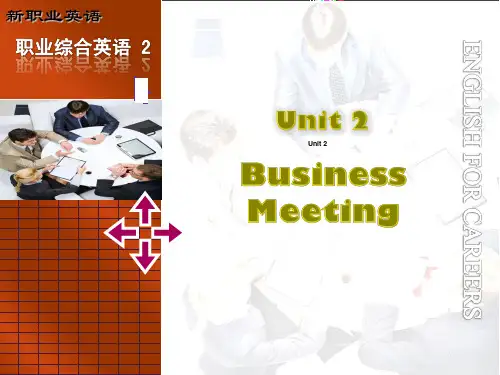
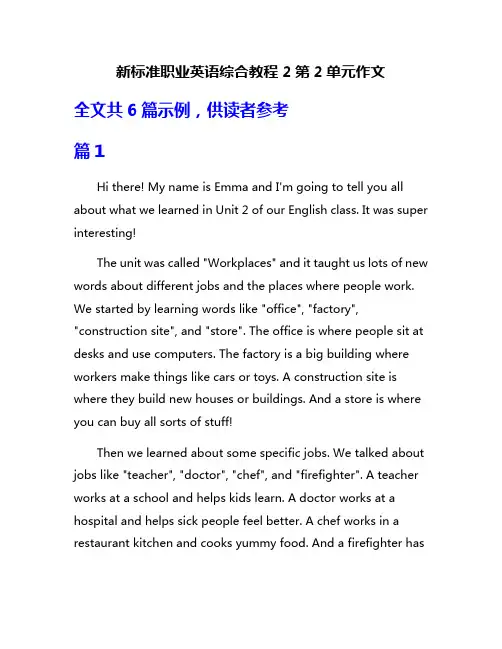
新标准职业英语综合教程2第2单元作文全文共6篇示例,供读者参考篇1Hi there! My name is Emma and I'm going to tell you all about what we learned in Unit 2 of our English class. It was super interesting!The unit was called "Workplaces" and it taught us lots of new words about different jobs and the places where people work. We started by learning words like "office", "factory", "construction site", and "store". The office is where people sit at desks and use computers. The factory is a big building where workers make things like cars or toys. A construction site is where they build new houses or buildings. And a store is where you can buy all sorts of stuff!Then we learned about some specific jobs. We talked about jobs like "teacher", "doctor", "chef", and "firefighter". A teacher works at a school and helps kids learn. A doctor works at a hospital and helps sick people feel better. A chef works in a restaurant kitchen and cooks yummy food. And a firefighter hasto be really brave - they put out fires and rescue people! Isn't that cool?After that, we practiced describing what people do at their jobs using verb phrases. Like a teacher "gives lessons", a chef "prepares meals", and a firefighter "operates equipment" and "provides emergency services". I thought those phrases sounded really grown-up and official!The hardest part was learning to talk about job qualifications and responsibilities. Qualifications are the things you need to get a certain job, like degrees or certifications. And responsibilities are the duties and tasks you have to do at your job. For example, to be a doctor you need to go to medical school for many years. And some of a doctor's big responsibilities are examining patients, prescribing medicine, and sometimes even performing surgery! Pretty intense stuff.We also learned how to write a basic job posting or advertisement. You have to include things like the job title, a little blurb describing the position, list of key responsibilities, qualifications needed, and instructions for how to apply. It was fun pretending to hire people for different wacky dream jobs like "Candy Taste Tester" or "Videogame Player"!Towards the end of the unit, we read a longer text about this really cool place called a "coworking space". It's kind of like an office, but people from different companies or who are freelancers rent desks or tiny offices to work at. I liked the idea because it seems more flexible and social than just working at home by yourself. The passage said coworking spaces often have fun extras like lounges, coffee bars, game rooms and event spaces too!My favorite part was the group activity where we had to design our own imaginary coworking space. My group decided to make ours a place just for kids with lots of games, art supplies, xboxes, and even a indoor playground! Of course we'd also have desks, computers and meeting rooms so kids could get work done too, but making it super fun was our main goal. We called it "The Kidpreneur Clubhouse" - catchy right?Well, that's pretty much everything I can remember about Unit 2. Learning about all the different jobs people do was really interesting. I don't know what I want to be when I grow up yet, but I feel like this unit gave me some good ideas! I could be a racecar driver, or an artist, or maybe even a scientist shooting rockets into space. As long as I work hard, I'm sure I'll find the perfect job for me. Thanks for reading, gotta run!篇2My Favorite JobHi everyone! My name is Timmy and I'm 8 years old. Today I want to tell you all about my favorite job that I want to have when I grow up. It's a really cool job and I think you'll like it too!The job I want is to be a zookeeper! Zookeepers get to work with all kinds of amazing animals every single day. They help take care of the animals, feed them, clean up after them, and make sure they are happy and healthy. How awesome is that?If I was a zookeeper, I would love getting to hang out with the big cats like lions and tigers. They are so powerful and fierce!I would want to play with them and pet them, but I know you have to be really careful because they could hurt you if they get mad. The zookeepers have to be brave.I would also love spending time with the monkeys and apes. They are so funny and silly! I bet it's really fun watching them swing around and make weird noises. Sometimes they throw poop though, so I would have to watch out for that if I was a zookeeper. Yuck!The slithery snakes would probably be a little scary to work with as a zookeeper. Some of them are poisonous which means they could make you really sick if they bite you. But some snakes are friendly and don't bite at all. I think I would get used to them after awhile.One of the best parts would be getting to work with the gentle giants - the elephants, rhinos, and hippos! They are just massive. I would look like a tiny little speck next to those humongous animals. But I hear they can be really calm and nice as long as you don't make them mad. I would give them trees and bushes to munch on.Oh oh! And I can't forget about the super tall giraffes. Wouldn't it be crazy to stand right next to one of those? Their necks are as tall as a whole house! I would have to use a really long broom to reach up and brush their fur. They eat leaves right off the tops of trees. How cool is that?Of course, I would get to see all the cute, fluffy animals too like bunnies, sheep, and those awesome kangaroos that hop everywhere with their babies in their pouches. I might even be allowed to pet some of them sometimes. A zookeeper's life isn't all just cleaning up poop!There are so many different types of animals at the zoo, it would be impossible to get bored. Every day would be an adventure seeing what the funny monkeys are up to or learning about how to care for a new animal. Plus, you get to teach kids and share facts about the different creatures. I would love that part since I'm a kid myself!Zookeepers have to study biology and animal behavior to really understand how to take care of all the unique animals properly. They have to know what each species likes to eat, what temperatures and environments they need, how to keep them active and engaged, and so much more. It's like being an animal doctor almost! I'm really good at science, so I think I could handle that part.The thing I would hate most about being a zookeeper is probably having to clean out the smelly animal pens and pick up all the poop and gunk. That would be so gross! But I guess it's an important part of keeping the animals healthy. Maybe I could hold my nose and bear it since I'd get to play with the cute animals right after!Another hard part would be when animals get sick or injured. Zookeepers have to help give them medicine and bandage them up. I wouldn't want any of my animal friends to be hurting! And ifan animal passes away, that would be really sad. I might cry a lot. But overall there's way more happy times than sad times when you work that close with wildlife.Zookeepers get to interact with wild, exotic beasts from all over the world that most people never get to see in person. They get to learn their behaviors and help make sure they stay around for a long, long time. To me, that sounds like an amazing job!Some kids want to be firefighters, police officers, or astronauts when they grow up. That's fine, but for me, I can't imagine anything better than being a zookeeper. Getting to be up close with majestic creatures every day and helping take care of them would be a dream come true!Of course, I'm only 8 years old, so I've got a long way to go before I can start studying to be a real zookeeper. But I'm going to work really hard in school, especially in science classes, so I can learn everything I need to know. And then watch out lions, tigers, and bears (oh my!), because Timmy the Zookeeper is coming for you!篇3My Favorite ThingsHi everyone! My name is Emma and I'm going to tell you about some of my very favorite things in the whole wide world. Get ready because this is going to be super exciting!My #1 favorite thing is my amazing family. I have the best mom and dad ever. My mom works at a big office downtown. She's really smart and always helps me with my homework. My dad is a construction worker and he builds really cool buildings and houses. He's really strong and funny too! I also have an older brother named Jack who is 10 years old. Sometimes he can be annoying but he's actually pretty nice to me most of the time. We always have fun playing video games and watching movies together. Jack is my best friend.Another one of my favorite things is my dog Buddy. Buddy is a golden retriever and he's the cutest, fluffiest pup you'll ever see! Whenever I get home from school, Buddy comes running up to greet me wagging his tail like crazy. He always makes me laugh with his silly puppy dog faces and goofy personality. I love taking Buddy on walks around the neighborhood and to the dog park to play fetch. He's honestly just the sweetest, most loyal dog in the universe.Speaking of things I love to do, playing sports is definitely at the top of my list of favorite activities. Soccer is probably my #1sport - I play on a team every Fall and we practice twice a week after school. I'm a forward and I've scored lots of goals! I also really like basketball, swimming, and gymnastics. Basically any sport that involves running around and being active is a winner in my book. It's so much fun and keeps me healthy and energized. Plus my teammates are all my great friends so practices and games are just one big party.You know what else I cannot get enough of? Ice cream! Chocolate is my all-time favorite flavor but I honestly don't think I've ever met an ice cream I didn't like. My family loves going to the local creamery on Friday nights to get big sundaes or milkshakes. It's become our little weekly tradition. Whenever we have ice cream at home, I always beg my parents for an extra big scoop. It's just so delicious and creamy...I'm smiling just thinking about it!I'm a total bookworm too. Reading is one of my most very favorite activities ever. I'll read absolutely anything - novels, comic books, magazines, you name it! But I especially love fiction stories with adventure, mystery, or magic. Some of my favorite book series are Harry Potter, Percy Jackson, The Borrowers, and The Boxcar Children. I get totally swept up in the amazing worldsand characters. Reading just transports me to another reality for a little while. It's the best way to uso your imagination!Speaking of using my imagination, I really love art class at school. Getting to draw, paint, sculpt with clay - it's all just so fun and creative. I'm certainly no master artist or anything, but I have a blast working on different projects. Making crafts like potholders and jewelry is tons of fun as well. Anything where I can tap into my creativity gets two thumbs up from me. My room at home is practically wallpapered with all my various artwork!Boy, this is a ton of favorites, huh? Let me try to wrap it up. A couple other things I love are the beach/ocean, going camping with my family, playing fun games like Candyland or Chutes & Ladders, and watching movies (my favorites are animated Disney/Pixar films). Oh and of course candy and other sweet treats are high on the list as well!So those are just some of my many, many favorite things in this awesome world we live in. There are endless sources of happiness and wonder if you just take a minute to appreciate the little joys in life. Spending quality time with loved ones, delicious snacks, playing games and sports, reading and using my creativity - these are the things that make me smile ear-to-ear. Ifeel so grateful to have such an amazing family, friends, home, and millions of tiny pleasures that brighten each and every day.What about you? What are some of your most very favorite things? I'd love to hear all about the special people, activities, foods, and miscellaneous awesomeness that makes your heart happy. The more things to smile about the better, am I right? Well, thanks for reading about my faves - that's all I've got for today. Until next time...bye!篇4Unit 2 - The Working WorldHiya! My name is Billy and I'm 10 years old. Today I want to tell you all about the working world because that's what we learned about in English class. It was really interesting!First up, we learned about different kinds of jobs people can have. There are sooooo many! My dad is a lawyer which means he helps people with laws and goes to court. My mom is a doctor and she helps sick people feel better. I think both of those jobs sound hard!Some other cool jobs are police officers who catch bad guys, firefighters who save people from fires, and astronauts who goto space! I'd love to be an astronauts and fly a rocket ship. Wouldn't that be awesome?Then we learned about workplaces. A workplace is where you go to do your job. My dad's workplace is an office with lots of desks and computers. My mom's workplace is a hospital with beds for sick people.Other workplaces are stores where people sell things, restaurants where chefs cook yummy food, and schools where teachers help kids learn. I'm really glad my workplace is just my school and not somewhere boring like an office!We also talked about what people wear to work. It's called a uniform or work clothes. Police officers wear cool uniforms with badges and hats. Doctors and nurses wear scrubs which are kind of like pajamas. Construction workers wear hard hats and boots to stay safe.My work clothes are just my regular clothes like t-shirts, shorts, and sneakers. Although sometimes I haveto wear fancier clothes like a polo shirt or a dress for special days at school. I don't mind too much though!Another big part of the working world is schedules and hours. A schedule is a plan that says when youhave to work. Mydad works from 9am to 6pm on weekdays. That's a looooong time! I'm so lucky I just have to go to school from 8:30am to 3pm. My mom has a crazier schedule because she has to work night shifts sometimes when other doctors aren't there.We learned that different jobs have different hours based on their schedules. Some people work part-time, which is just a few hours a day. Others work full-time, which is most of the day. A few people even have to work overnight!The last thing we covered was teamwork. Teamwork means working together as a group to get something done. Lots of jobs need good teamwork. Doctors, nurses, and other hospita lworkers have to team up to take care of patients. The cashiers and stockers at a grocery store are a team to keep the store running well.Even kids like me use teamwork! When we have group projects at school, we all have to cooperate and do our parts to get a good grade. Teamwork is really important.Well, that's all the main stuff I learned about the working world! It was a really cool unit. I can't wait to grow up and get a job...just maybe not one where I have to work ridiculous hours like my parents! Being a kid is hard enough work if you ask me. Thanks for reading, bye!篇5My New English Textbook is So Cool!Hi everyone! I'm so excited to tell you about my new English textbook for this year. It's called the New StandardCareer-Oriented Comprehensive English Course 2, and it's awesome! The second unit we just started is all about work and jobs. Learning about careers is so much fun.I can't wait to study all the different job titles and what people do at work. There are so many neat careers to learn about. My dad is an accountant, so I know a little about that job already. But I want to learn about being a doctor, scientist, teacher, chef, firefighter, and all the rest!In the first part of the unit, we're learning basic vocabulary words related to work and the workplace. That means learning the names of different occupations like "dentist" and "zookeeper." It also covers objects and things you'd find in an office, such as computers, desks, filing cabinets, and so on. The vocabulary section has really neat pictures that make it easy to remember what each word means.My favorite part so far has been the dialogues where people talk about their jobs. I love trying to imitate their conversationswith my classmates. It's funny to pretend to be a businessman asking my friend to make some photocopies! The dialogues show common situations that happen at work like attending meetings, giving presentations, and talking on the phone. I can't wait to learn more phrases for workplace smalltalk.The dialogues also sometimes describe what people's typical work days are like. For the firefighter one, they talked about putting out fires, giving CPR, rescuing cats from trees, and other heroic things firefighters do. The scientist dialogue mentioned running experiments, analyzing data, and making groundbreaking discoveries. I think it's so fascinating to learn the nitty-gritty details of how people actually spend their days for different careers.Another really interesting section covers business writing skills. So far we've learned how to format basic things like memos, emails, and reports typically sent between coworkers and managers. The examples show us how to properly organize these documents, what language to use, and standard conventions for professional communication. Maybe I'll get to put those skills to use if I have a part-time job when I'm older!The unit also has tips on interview techniques, networking, workplace etiquette, and so much more. I love the role-playingactivities where we practice greeting others, making introductions, and pretending to interview for different jobs. It's such a blast and makes me feel like a grown-up!Of course, no English textbook would be complete without grammar, reading, and listening exercises. I'll be honest, those parts can be pretty dry at times. But they do help cement all the new words and phrases I'm learning about work and business. The readings cover topics like the daily routines of certain professionals, major industries across different countries, the benefits of freelancing versus traditional employment, and inspirational stories about people's career journeys. As for the listening, we hear people talking about their job searches, experiences at work, office anecdotes, and other work-related discussions.Overall, I'm really enjoying Unit 2 so far. Getting this inside peek into the professional world makes me excited to have a career someday. Maybe I'll be a marine biologist and get to swim with dolphins all day! Or I could be an artist and create amazing paintings. A chef could be fun since I love food so much. Honestly, I'm still pretty undecided on what I want to be when I grow up. But learning about so many fascinating jobs is giving me lots of ideas to consider.I can't wait to see what other career topics are covered in future units of this textbook. I just know Unit 2 is preparing me really well already. Learning all this workplace language and etiquette is making me feel way more grown up. Who knew studying could be this engaging and open up my eyes to the different options for my future? Thanks to this awesome new textbook, I'm becoming a knowledgeable career girl before I've even had my first job!篇6My New English ClassHi! My name is Tommy and I'm 10 years old. I just started a new English class this year called "New Standard Vocational English" and I want to tell you all about it!The class is really cool because instead of just learning boring grammar rules and vocabulary words, we get to learn English through different jobs and careers. In Unit 1, we learned all about being a waiter or waitress at a restaurant. We practiced taking food orders, describing different dishes on the menu, and even role-played being servers and customers. It was a lot of fun!But my favorite unit so far has been Unit 2 all about being a tour guide. Miss Lee, my English teacher, turned our wholeclassroom into a little tourist office. We made brochures and maps for an imaginary city called "Unitopolis." Then we took turns giving tours around the classroom while the other students pretended to be visitors.To get ready, we first had to learn a lot of new vocabulary words related to traveling, sightseeing, and giving directions. Like how to say words like "departure," "arrivals," "check-in," "baggage claim," and stuff like that. We also learned expressions that tour guides use like "If you'll follow me..." or "Our next stop will be..."Then we studied different world-famous landmarks and tourist attractions so we could describe them on our tours. I learned all about places like the Eiffel Tower in Paris, the Great Pyramids in Egypt, the Taj Mahal in India, and the Statue of Liberty in New York City. Giving directions was kind of tricky at first because I had to remember things like "go straight," "turn left," "it's on your right," and so on.When it was finally time to actually give our tours, I was really nervous! But Miss Lee had decorated our classroom with so many cool things that it made it easier. She had made little paper models of famous buildings and put up pictures of famouspaintings and sculptures. There were even stuffed animals representing wildlife you might see on a safari!My favorite part was when I got to take the other students through our "Unitopolis Zoo." I got to describe all the different animals like lions, elephants, and zebras. I even roared like a lion once which made everyone laugh. After we finished going through all the exhibits, I thanked everyone for "coming" and told them to visit the gift shop on their way out for souvenirs!Some of the other tours my classmates gave were amazing too. Peter took us on a tour of "Unitopolis Museum of Art" while Jessica guided us through "Ancient Unitopolis Ruins." It was awesome how creative everyone got with their imaginary cities and tours.At the end of the unit, we had a contest to vote for the best tour guide in the class. The winner got to be Class Tour Guide for a whole week! That meant they got to lead warm-up activities and games all related to their "Unitopolis" tour. I didn't win, but Mary did a great job as our Class Guide teaching us fun new travel words and directions.I learned so much English from this unit by pretending to bea tour guide. Things finally started clicking into place about using the right tenses and sentence structures to describe places, giveinstructions, and talk about the past, present and future. It was way more fun than just memorizing grammar rules from a textbook.My parents were really impressed when I could tell them all about the Leaning Tower of Pisa and Great Wall of China in English. I'm glad this is a multi-year English course too because I'm already excited to learn what other cool jobs and careers we'll get to explore next. Maybe something adventurous like being a explorer, scientist or race car driver? I'll be sure to let you know!For now, I'm working on my souvenir sales pitch: "Get your Unitopolis t-shirts, keychains and coffee mugs here!" Maybe I'll get to use it if Miss Lee lets us open a real gift shop in our classroom. Who knows what fun we'll have next in New Standard Vocational English?。
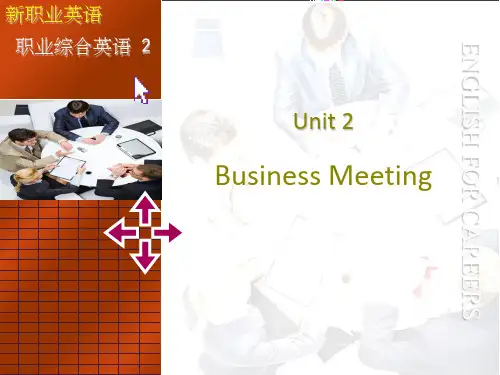
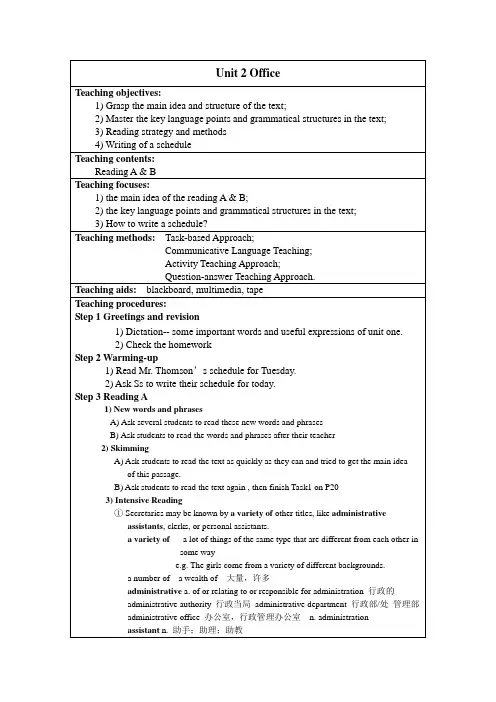
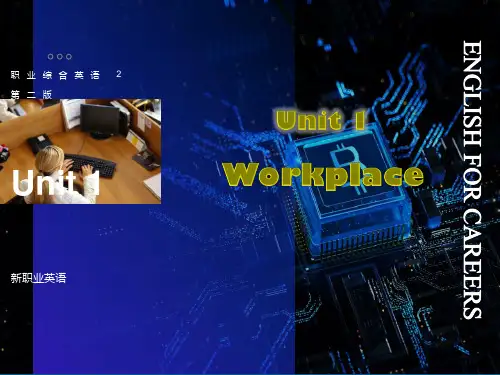
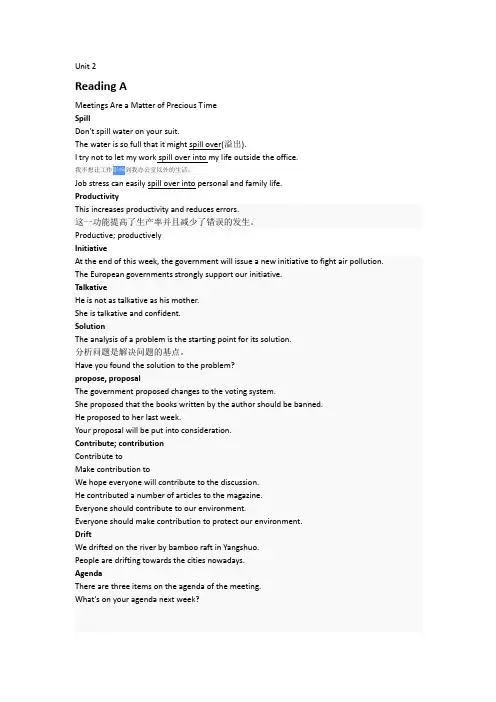
Unit 2Reading AMeetings Are a Matter of Precious TimeSpillDon't spill water on your suit.The water is so full that it might spill over(溢出).I try not to let my work spill over into my life outside the office.我不想让工作到我办公室以外的生活。
Job stress can easily spill over into personal and family life.ProductivityThis increases productivity and reduces errors.这一功能提高了生产率并且减少了错误的发生。
Productive; productivelyInitiativeAt the end of this week, the government will issue a new initiative to fight air pollution. The European governments strongly support our initiative.TalkativeHe is not as talkative as his mother.She is talkative and confident.SolutionThe analysis of a problem is the starting point for its solution.分析问题是解决问题的基点。
Have you found the solution to the problem?propose, proposalThe government proposed changes to the voting system.She proposed that the books written by the author should be banned.He proposed to her last week.Your proposal will be put into consideration.Contribute; contributionContribute toMake contribution toWe hope everyone will contribute to the discussion.He contributed a number of articles to the magazine.Everyone should contribute to our environment.Everyone should make contribution to protect our environment.DriftWe drifted on the river by bamboo raft in Yangshuo.People are drifting towards the cities nowadays.AgendaThere are three items on the agenda of the meeting.What’s on your agenda next week?—Assign, assignmentThe teacher assigned a different task to each of the students.We can assign him an important mission.I was assigned a pleasant room to work in.Written assignmentYou have got your first assignment.Resource ; sourceShe is working in human resource department.We should protect our limited natural resource.PerishableSuch kinds of flowers are perishable.There perishable foods must be kept in a refrigerator.NonethelessBut , however, neverthelessShe doesn’t know anything against him, nonetheless she doesn’t trust him.She doesn’t know anything against him, nevertheless she doesn’t trust him.Vague, vaguelyThe final letter is very vague, possibly an r or a k.They were vague about their backgrounds.I vaguely remember their house.我依稀记得他们的房子。

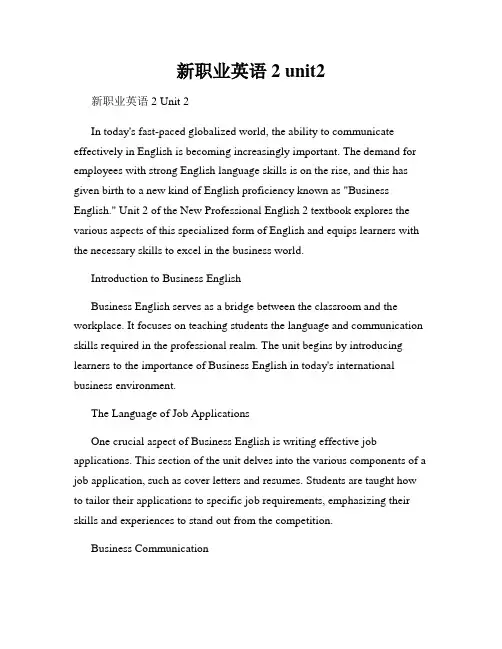
新职业英语2 unit2新职业英语2 Unit 2In today's fast-paced globalized world, the ability to communicate effectively in English is becoming increasingly important. The demand for employees with strong English language skills is on the rise, and this has given birth to a new kind of English proficiency known as "Business English." Unit 2 of the New Professional English 2 textbook explores the various aspects of this specialized form of English and equips learners with the necessary skills to excel in the business world.Introduction to Business EnglishBusiness English serves as a bridge between the classroom and the workplace. It focuses on teaching students the language and communication skills required in the professional realm. The unit begins by introducing learners to the importance of Business English in today's international business environment.The Language of Job ApplicationsOne crucial aspect of Business English is writing effective job applications. This section of the unit delves into the various components of a job application, such as cover letters and resumes. Students are taught how to tailor their applications to specific job requirements, emphasizing their skills and experiences to stand out from the competition.Business CommunicationClear and concise communication is vital in the business world. In this section, students learn how to effectively communicate through email, letters, and phone calls. They are introduced to common business phrases and expressions, enabling them to convey their messages professionally and assertively.Negotiation SkillsNegotiation is an essential skill in business. This section provides learners with the necessary language and strategies to negotiate successfully. They learn how to express their interests, trade-offs, and reach mutually beneficial agreements. Practical exercises and role-plays further enhance their negotiation skills.Business MeetingsAttending and participating in business meetings is a common occurrence in the corporate world. This section teaches students the language and etiquette required for fruitful interactions during meetings. They learn how to contribute their ideas, express agreement or disagreement, and handle various meeting scenarios.Business PresentationsThe ability to deliver effective presentations is highly valued in the professional world. In this section, learners are taught how to structure and deliver impactful presentations. They learn techniques for engaging the audience, using visual aids, and presenting data effectively.Cross-Cultural CommunicationIn the global business landscape, cultural sensitivity is crucial. This section addresses the challenges of cross-cultural communication and provides strategies to navigate them successfully. Students gain insights into different cultural norms and expectations, allowing them to communicate respectfully and avoid misunderstandings.ConclusionUnit 2 of the New Professional English 2 textbook equips learners with the essential language and communication skills needed to thrive in the business world. From job applications to presentations and cross-cultural communication, students develop the proficiency required to excel in various professional settings. By mastering Business English, individuals can enhance their career prospects and effectively navigate the globalized business environment.。
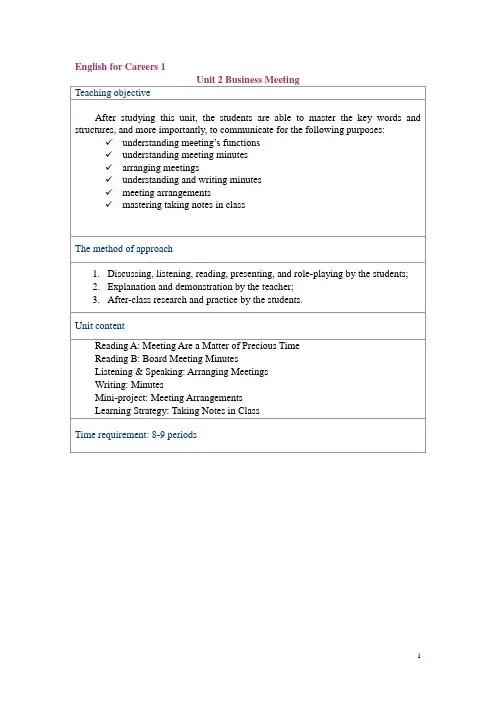
English for Careers 1Unit Focuschime in propose contribute (to) assignperishable vague disengaged effectiveexplicit specify tangible in chargeTeaching proceduresThis unit is arranged for a time span of 8 hours, during which a time limit is suggested for each step. Though it’s always important to keep a time limit in mind for each activity, a teacher should never stick to a rigid time plan in teaching, but rather follow a more flexible time table when dealing with unexpected in-class occurrences and make necessary adjustments accordingly.Note that not every step suggested here is a must in teaching. A teacher can make whatever changes he thinks necessary.Hour 1:Course introduction 45 minutes Warming-up Task 15 minutes Objective:Ss can identify different tasks at each stage of running a business meeting. Steps:• Ss read Warming-up Task.• Get Ss to read through the list of tasks.• Ask Ss to match the given tasks with the stages of a meeting.• Give the suggested answers.Suggested answers:New words in Reading A 15 minutes Objective: Ss can get familiar with the new words and expressions, etc.Steps:• Ss listen to the new words and expressions, etc.• Ss read the new words and expressions, etc.Notes: For a class with higher English proficiency, the teacher may follow thefollowing steps:• Ss preview the new words and expressions.• Ss read the new words and expressions.• Ss dictate several important new words and expressions.Discussions before Reading A 15 minutes Objective: Ss can get familiar with the new words and expressions, etc.Steps:• Ss know something abo ut Reading A.• Ss discuss the following two questions:1.In your opinion, what are meetings’ functions?2.How do we make meetings more productive?• Comment briefly on their work.Hours 2-3:Reading A 45 minutesLanguage points 35 minutesParagraph 1chime in: to join or interrupt a conversation; to agree with somethinge.g. He kept chiming in with his own opinions.The artist’s illustrations chime in perfectly with the text.Her expectation chimes in with the belief of many others.propose: v. to suggest a plan or idea, etc. for people to think about or decide one.g. The government proposed changes to the voting system.She proposed that the books written by the author should be banned.contribute (to): v. to speak during a meeting or a conversation, or write things for a newspaper, magazine, etc.e.g. We hope everyone will contribute to the discussion.He contributed a number of articles to the magazine.Paragraph 2assign: v. to give someone a particular job or responsibility; to give money, equipment, etc. to someone to usee.g. The teacher assigned a different task to each of the students.We can assign him an important mission.I was assigned a pleasant room to work in.Paragraph 3perishable: a. likely to decay or go bad quicklye.g. Such kinds of flowers are perishable.These perishable foods must be kept in a refrigerator.vague: a. of an uncertain, indefinite or unclear character or meaninge.g. The final letter is very vague, possibly an “R” or a “K”.The terms of the agreement were left deliberately vague.They were vague about their backgrounds.Paragraph 4disengaged: a. not involved with or interested in something or someone, and feeling separate from theme.g. He had a disengaged look in his eyes.One disengaged worker can affect the morale of the entire team.effective: a. successful in producing a desired or intended resulte.g. We must take effective measures to deal with these problems.Despite all modern technologies, the most effective form of communication is still face-to-face.explicit: a. stated clearly and in detail, leaving no room for confusion or doubte.g. He has an explicit understanding of the problem.He was quite explicit about what he expected us to do for him.He gave me explicit directions on how to get there.specify: v. to state something in an exact and detailed waye.g. Please specify when you will be at home tomorrow.Remember to specify your size when you order clothes.The regulations specify that calculators may not be used in the examination. tangible: a. that can be clearly seen to existe.g. We cannot accept his findings without tangible evidence.The scheme must have tangible benefits for the unemployed.Sculpture is a tangible art of form.in charge: being responsible fore.g. The monitor is in charge when the teacher is not here.An experienced engineer is in charge of the project.Task 1 5 minutes Objective:Ss can understand the passage and choose the correct answers.Steps:• Ss do Task 1.• Ask Ss to work individually.• Check the answers.Suggested Answers: 1. D 2. A 3. A 4. B 5. CTask 2 5 minutes Objective:Ss can write down the missing information according to the passage. Steps:• Ss do Task 2.• Ask Ss to work individually.• Check the answers.Suggested Answers:Language lab 45 minutes Task 1 5 minutes Objective:Ss know the spelling and meaning of the words and expressions from Reading A.Steps:• Ss read Task 1.• Allow Ss 5 minutes to do the task.• Check the answers.KeyKey:1. A2. J3. E4. H5. C6. B7. F8. D9. I 10. GTask 2 10 minutes Objective:Ss can use the words and expressions from Reading A.Steps:• Ss do Task 2.• Ask Ss to work individually.• Check the answers.Answers1. proposed2. assign3. spill4. vague5. agenda6. specifying7. apparently8. effective9. renew 10. explicitTask 3 10 minutes Objective:Ss can use the words and expressions from Reading A.Steps:• Ss do Task 3.• Ask Ss to work individually.• Check the answers.Key:1. It was cold. Nonetheless, I went swimming.2. He tried to justify his absence with poor excuses.3. In order for our team to win, everyone has to contribute.4. Who is in charge of the quality control in your company?5. Mr. Blair was about to draw his conclusion when the manager cut in with a question.Task 4 10 minutes Objective: Ss can express ideas in writing using the two models outlined for Task 4. Steps:• Read the models to Ss with an explanation if needed.• Ss work in pairs.• Check the answers.Key:Model 11. The reason for her asking for leave is that she was sick.2. The reason for John’s quitting his job is that he wants to further his study abroad.3. The reason for my joining the team is that I like change.Model 21. I walked into the office slowly, thinking about how to tell my boss the bad news.2. The athletes appeared on the sports ground, smiling to the audience.3. He sat there silently, realizing that all his efforts had come to nothing.Task 5 10 minutes Objective:Ss can use the vocabulary in Reading A for translation.Steps:• Ss work individually or in pairs and translate the sentences.• Ask two Ss to write their translations on the board.• Comment briefly on their work with emphasis on the structures of their sentences.Key:1. I spilt coffee all over my desk.2. We were all asked to contribute ideas at the meeting.3. Fruits are perishable during transportation.4. The officer in charge was wounded badly in the battle.5. Apparently, no one has been living in that flat.6. He got a payoff before the retirement.7. The manager is assigning the work to several clerks.8. They are working hard to find a peaceful solution to the conflict.Hours 4-5:Listening 45 minutes Task 1 5 minutes Objective:Ss can accurately write down the missing information.Script:M: Excuse me, Ma’am. I would like to speak to someone about the conference room.And the front desk told me to come to you.W: Of course. Tell me about what you have in mind and I’ll show you what we can offer. First of all, how many people are involved?M: I need to arrange a day’s presentation to about sixty persons.W: Do you have any time now to look at our facilities?M: I got about ten minutes. Could we do it quickly?W: Of course. You say you need a room for sixty people?M: Yes, that’s right.W: And it’s a presentation, isn’t it? Here’s our main conference room. It has excellent projection facilities. We have full stereo sound, videos, 35mm slides. You name it; we have it.M: How much is this for one day?W: We have a standard rate of $900 per half day which includes coffee and biscuits. M: That’s quite expensive.W: Perhaps we could work something out. Shall we go back to my office?KeyKey:Task 2 10 minutes Objective:Ss can decide whether the statements are true or false.Script:M: We need everybody’s idea on this project, so I’d like to fix a time to meet this week and hear what you all have to say.W: Does everybody need to be there? Nicole and Kelvin are on vacation this week. M: It would be best if everybody could be there. How about sometime next week? W: Let me look at the schedule. Can we set it for Tuesday at 10 a.m.?M: That’s out for me. I already have a standard meeting on Tuesday at 9:30 a.m. How about Tuesday afternoon at 2 p.m.?W: I prefer to meet in the morning. I will not be in the company most afternoons next week. What about next Wednesday morning?M: I don’t have any problems with that. Let’s set it up for 9:30 Wednesday morning and we can carry it over to Thursday and Friday if we need to.W: Fine with me. Nicole and Kelvin will be back next Monday.M: Good, then I can tell Ms. Smith to get the meeting room ready.Q1: Why can’t they have the meeting this week?Q2: When is the man going to have a standard meeting next week?Q3: When are they going to have the meeting?Key: 1. A 2. B 3. CTask 3 10 minutes Objective: Ss can accurately write down the missing information.Script & Key:M: Is the room ready for the meeting, Ms. Smith?W: Yes, Mr. Wright. I’ve put the Minutes Book, some spare copies of the agenda and some paper and pencils on the table.M: Have the members been notified?W: Yes, sir. I have given the committee members informal notice of the meeting either by telephone or by memo.M: Great! Also, a separate folder should be made for each meeting. All papers on the matters to be discussed are put into this folder. There should also be copies of the notice of the meeting, a list of group members, drafts of resolutions, if any, and the minutes of the last meeting.W: Yes, sir. All this is done. Here is a copy of the agenda that’s been prepared.M: Great. Have you prepared the minutes from the last meeting?W: Yes, sir. I have provided all the necessary materials. I have also prepared a meeting memo.M: Excellent. After the meeting has been adjourned, please inform the interested parties of any action taken. Write up the official notice in duplicate.W: OK, I’ll do that.Task 4 10 minutes Objective: Ss can understand the conversation and choose the best answer.Script:Although meetings can be scheduled at any time during the day, certain times are preferable. Early in the morning and right after lunch are popular meeting times. Many business people hold working breakfasts, lunches and dinners to accomplish two things at the same time and meals are often served or brought into the workplace for meetings.When scheduling a meeting, consider the travel needs of the participants. An 8:00 a.m. meeting that forces people to get up at 5:30 a.m. may be unproductive. Even if the participants arrive on time, they may be too tired to accomplish anything during the meeting. Nonetheless, early morning scheduling is not unusual.In a meeting that involves presentations, it is important to talk with each presenter in advance to find out how much time he or she will need. In this case the final agenda should reflect input from everyone participating in the meeting.If you need to hold a series of meetings, schedule a time for the next meeting at the end of the current one. To schedule the first meeting, write a memo or send an email message instead of using the telephone. Scheduling a meeting by telephone can take two or three days as you call and re-call participants with conflicting schedules.Key: 1. T 2. F 3. FTask 5 10 minutes Objective:Ss can find specific information from listening to a passage related to the theme.Script:A business meeting is where people come together in an organized manner to discuss matters and make decisions. Here is the procedure that should be followed when holding a business meeting.Before the meeting, all relevant people should be notified. This can be done by letter, memo, notice board, telephone or in person. They should be told the place, the date and time of the meeting and what it is about.At the meeting, the chairperson will introduce each item on the agenda and will invite people to discuss it. The chairperson will conduct the meeting, ensuring that people stick to the point and that everyone who wants to speak gets the opportunity to do so. The chairperson must try to guide the discussion towards an agreed decision; if this is not possible the chairperson may propose a vote.During the meeting, there usually is a person, often a secretary, assigned to take down the minutes. The minutes are records of everything that is discussed and any decisions that are made. They will be typed up afterwards and circulated to all the relevant people.Key: C → A → D → B → ESpeaking 45 minutes Task 6 45 minutes Objective:Ss are able to practice chairing meetings and giving comments.Steps:• Ss read Task 6.• Ss work in pairs, one as a chairperson and the other as a participant.Key: (Omitted)Hours 6-7:Reading B 45 minutesNew words 5 minutes Objective: Ss can get familiar with the new words and expressions, etc.Steps:• Ss listen to the new words and expressions, etc.• Ss read the new words and expressions, etc.Fast reading 20 minutes Objective:Ss can comprehend Reading B.Steps:• Ss read the passage.• Provide help if needed.Task 1 10 minutes Objective:Ss can decide whether the following statements are true or false according to the passage.Steps:• Ss read the passage.• Ss complete the task.• Ss compare their work with others.• Select Ss to present their work.KeyKey: 1. F 2. T 3. T 4. F 5. FTask 2 10 minutes Objective:Ss can comprehend the specific information taken from the passage. Steps:• Ss read the passage.• Ss complete the task.• Ss compare their work with others.• Select Ss to present their work.Key:Writing 45 minutes Task 1 15 minutes Objective:Ss can get familiar with the style of minutes.Steps:• Ss do the task individually.• Ss compare with each other’s answers.• Provide help if needed.• Present the answers.Suggested Answers1. The Marketing Department is responsible for the Company’s sales decline last year.2. We should increase our advertising budget for next year.3. If exports drop in the fourth quarter, we will have to think about developing the domestic market.4. All the sales representatives over-fulfilled this year’s plan, so I strongly recommend an increase in their salaries.5. Changes in the exchange rate led to an increase in production cost. Therefore, I recommend caution in future trading.Task 2 15 minutes Objective:Ss can get familiar with the style of minutes.Steps:• Ss do the task individually.• Ss compare with each other’s answers.• Provide help if needed.• Present the answers.Key:1—B 2—D 3—E 4—A 5—CTask 3 15 minutes Objective:Ss can get familiar with the style of minutes.Steps:• Ss do the task individually.• Ss compare with each other’s answers.• Provide help if needed.• Present the answers.Key: (Omitted)Hour 8:Mini-Project 40 minutesObjective:Ss can know how to hold an English speech contest.Steps:•Grouping. Divide the class into groups. There are several ways: Ss pick up their own partners; Teachers group fast learners with slow learners; Ss find their partners by drawing lots.•Defining the project. Go through the project with the class and clarify requirements.。
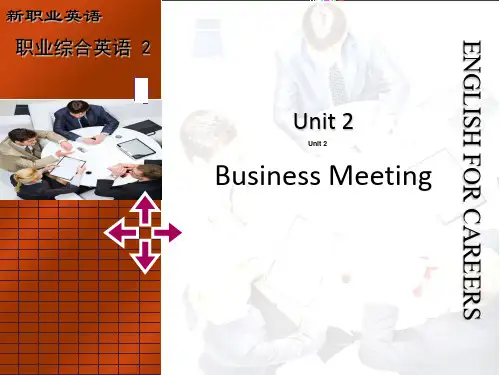

新职业英语2 unit twoUnit 2Reading AMeetings Are a Matter of Precious Time SpillDon't spill water on your suit.The water is so full that it might spill over(溢出).I try not to let my work spill over into my life outside the office. 我不想让工作影响到我办公室以外的生活。
Job stress can easily spill over into personal and family life. ProductivityThis increases productivity and reduces errors.这一功能提高了生产率并且减少了错误的发生。
Productive; productively InitiativeAt the end of this week, the government will issue a new initiative to fight air pollution. The European governments strongly support our initiative. TalkativeHe is not as talkative as his mother. She is talkative and confident. SolutionThe analysis of a problem is the starting point for its solution. 分析问题是解决问题的基点。
Have you found the solution to the problem? propose, proposalThe government proposed changes to the voting system.She proposed that the books written by the author should be banned. He proposed to her last week.Your proposal will be put into consideration. Contribute; contribution Contribute toMake contribution toWe hope everyone will contribute to the discussion. He contributed a number of articles to the magazine. Everyone should contribute to our environment.Everyone should make contribution to protect our environment. DriftWe drifted on the river by bamboo raft in Yangshuo. People are drifting towards the cities nowadays. AgendaThere are three items on the agenda of the meeting. What’s on your agenda next week?1Assign, assignmentThe teacher assigned a different task to each of the students. We can assign him an important mission. I was assigned a pleasant room to work in. Written assignmentYou have got your first assignment. Resource ; sourceShe is working in human resource department. We should protect our limited natural resource. PerishableSuch kinds of flowers are perishable.There perishable foods must be kept in a refrigerator. NonethelessBut , however, neverthelessShe doesn’t know anything against him, nonetheless she doesn’t trust him. She doesn’t know anything against him, nevertheless she doesn’t trust him. Vague, vaguelyThe final letter is very vague, possibly an r or a k. They were vagueabout their backgrounds. I vaguely remember their house. 我依稀记得他们的房子。
新职业英语二unit21、—Where are you going, Tom? —To Bill's workshop. The engine of my car needs _____. [单选题] *A. repairing(正确答案)B. repairedC. repairD. to repair2、It’s windy outside. _______ your jacket, Bob. [单选题] *A. Try onB. Put on(正确答案)C. Take offD. Wear3、My father?is _______ flowers. [单选题] *A. busy watering(正确答案)B. busy waterC. busy with wateringD. busy with water4、The more he tried to please her, _____she seemed to appreciate it. [单选题] *A.lessB.lesserC.the less(正确答案)D.the lesser5、Boys and girls, please _______ your favorite book here and show it to us next class. [单选题] *A. bring(正确答案)B. sellC. buyD. take6、()of the twins was arrested because I saw them both at a party last night. [单选题] *A. NoneB. BothC. Neither(正确答案)D. All7、His father always _______ by subway. [单选题] *B. go to schoolC. goes to bedD. goes to work(正确答案)8、_______ travelers come to visit our city every year. [单选题] *A. Hundred ofB. Hundreds of(正确答案)C. Five HundredsD. Five hundred?of9、When Max rushed to the classroom, his classmates _____ exercises attentively. [单选题] *A. didB. have doneC. were doing(正确答案)D. do10、John had planned to leave but he decided to stay in the hotel for _____ two days because of the heavy rain. [单选题] *A. otherB. another(正确答案)D. others11、Is there ____ for one more in the car? [单选题] *A. seatB. situationC. positionD. room(正确答案)12、I paid twenty yuan _______ the book. [单选题] *A. offB. backC. for(正确答案)D. with13、—Excuse me, how long does it ______ to walk to the library? —About 15 minutes, I’m afraid.()[单选题] *A. take(正确答案)B. spendC. costD. pay14、—______ do you pay for it? —Over the Internet. ()[单选题] *A. WhatB. How muchC. How(正确答案)D. When15、---Excuse me sir, where is Room 301?---Just a minute. I’ll have Bob ____you to your room. [单选题] *A. show(正确答案)B. showsC. to showD. showing16、37.It’s fun _________ a horse with your best friends on the grass. [单选题] *A.to ride (正确答案)B.ridingC.ridesD.ride17、41.—________ do you take?—Small, please. [单选题] *A.What size(正确答案)B.What colourC.How manyD.How much18、74.In England people drive________. [单选题] *A.on the left(正确答案)B.in the leftC.on leftD.in left19、2.I think Game of Thrones is ________ TV series of the year. [单选题] * A.excitingB.more excitingC.most excitingD.the most exciting (正确答案)20、The notice put _______ on the wall says “No Smoking”. [单选题] *A. up(正确答案)B. offC. awayD. out21、—Is this ______ football, boy? —No, it is not ______.()[单选题] *A. yours; myB. your; mine(正确答案)C. your; meD. yours; mine22、The green shorts are _______ sale for $[单选题] *A. forB. on(正确答案)C. atD. with23、73.The moonlight goes ____ the window and makes the room bright. [单选题] * A.acrossB.through(正确答案)C.overD.in24、---Where’s that report?---I brought it to you ____you were in Mr. Black’s office yesterday. [单选题] *A. ifB. when(正确答案)C. becauseD. before25、What he said sounds _______. [单选题] *A. pleasantlyB. nicelyC. friendly(正确答案)D. wonderfully26、We are looking forward to _______ you again. [单选题] *A. seeB. sawC. seeing(正确答案)D. seen27、65.There is a big sale on in the shop! Every-thing is ________ price. [单选题] *A.bigB.fullC.zeroD.half(正确答案)28、Study hard, ______ you won’t pass the exam. [单选题] *A. or(正确答案)B. andC. butD. if29、They all choose me ______ our class monitor.()[单选题] *A. as(正确答案)B. inC. withD. on30、______! It’s not the end of the world. Let’s try it again.()[单选题] *A. Put upB. Set upC. Cheer up(正确答案)D. Pick up。
新职业英语2unit Unit Two Business Meeting Meetings Are a Matter of Precious Time会议关乎宝贵的时间The meeting spills over into its second hour. We are discussing a productivity initiative. At this moment, our most talkative member chimes in with the idea that we need some kind of system to reward employees. This is the same solution he offers for every problem at every meeting. Then, another member cuts in with a long story—just to make the point that we are not the proper entity to recommend the kinds of changes we are proposing. I, meanwhile, contribute nothing useful. Finally, the woman who set the meeting calls it quits and tells us we’ll continue next week. We drift back to our offices, wondering how to make up for the wasted time. This meeting occurred many years ago, but similar ones happen at companies everywhere every day会议已经拖拖拉拉开了一个多小时,我们正在讨论如何提高生产效率的提案。